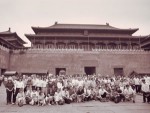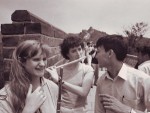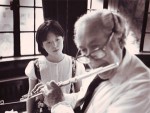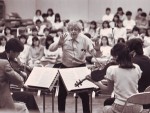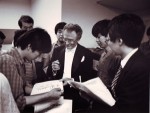Title
What we hear, what we know, what we think, and what we think we know about China is suddenly changing—sometimes day by day. We hear of booms in business and in building, we watch a torch make its way to a controversial Summer Olympics in Beijing, and of course we see more and more Chinese stars on American and European concert stages. It is China’s passion for Western art music with which Juilliard will connect when, on Monday, May 26, the Juilliard Orchestra, its conductor James DePreist, a piano soloist, and several support personnel fly out of Newark Liberty Airport on Juilliard’s second ever tour of mainland China. The first tour took place in 1987, before the events in and around Tiananmen Square. It has taken nearly 20 years for the climate to thaw again, but thaw it has, and now 95 of the orchestra’s student members are preparing for an array of events from May 29 to June 5 at the National Center for the Performing Arts in Beijing, at Suzhou’s Science and Cultural Arts Center, and at Shanghai’s Grand Theater (with time off to sightsee and visit the Great Wall). Partners include the Shanghai Conservatory of Music and the Central Conservatory of Music in Beijing. Writer David Pratt interviewed Juilliard President Joseph W. Polisi for The Juilliard Journal about the upcoming tour—and about his memories of the 1987 trip. Today, as President Polisi explains, the Juilliard contingent will find things much changed.
Members of the Juilliard Orchestra posing at the Forbidden City in Beijing in 1987.
(Photo by Henry Grossman)Robert Mann, then the first violinist in the Juilliard String Quartet, coaching a Chinese student ensemble.
(Photo by Henry Grossman)Maestro Stanislaw Skrowaczewski, who conducted the Juilliard Orchestra during is first tour of China in 1987, signing autographs.
(Photo by Henry Grossman)Body
How did plans take shape for the upcoming China tour?
We had been seeing over the past several years a healthy group of talented young Chinese musicians coming to Juilliard, in line with China’s expansion in business, technology, and so forth. Thirty-nine students from China are enrolled in the College Division and 14 in Pre-College. So this is an appropriate time to go back to China and with the Juilliard Orchestra. We had also been asked on many occasions to provide master classes by our faculty in China, and I had been invited to several cultural events there. And with the Olympics in August, this seemed like a good time to go.
Juilliard’s mission is to provide leadership in the performing arts worldwide, so it is my hope that teachers, students, government officials, and presenters in China will hear the Juilliard Orchestra and understand the standards of our performers. Periodically professional orchestras have come through China, and there are youth orchestras there as well. I am no longer objective about Juilliard, but the quality of the Juilliard Orchestra is exceedingly high, and I think it will be a unique experience for Chinese audiences to hear us perform.
You have a full orchestra going to China. What about soloists?
There are several. Conrad Tao, a Pre-College pianist—he’s 13—will be performing Prokofiev’s Third Piano Concerto and Shen Yang, a Chinese bass studying in the Juilliard Opera Center, will sing the “Cavatina” from Rachmaninoff’s opera Aleko. For the special “Friendship Concert” with the Central Conservatory in Beijing on June 1, the Central Conservatory Orchestra will play two American works conducted by James DePreist: Ives/Schuman’s Variations on “America” and Gershwin’s An American in Paris. The Juilliard Orchestra will play two Chinese works conducted by the conservatory’s conductor, Yu Feng, one of which will be Yin Chengzong’s [b. 1941] Yellow River Piano Concerto [1969], with Peng-Peng Gong, who is 15 and also in the Pre-College Division, as the soloist. [NOTE: This concerto, which uses Western musical notation but draws on Chinese themes, is based on the 1941 Yellow River Cantata by Xian Xinghai (1905-1945).] We will also hold a chamber performance of new American music at the Shanghai Conservatory.
And you yourself will conduct a master class as part of the tour…
Yes, I will conduct a public master class coaching a woodwind quintet. We will in fact hold six master classes led by Yoheved Kaplinsky, chairman of the Juilliard piano department and the artistic director of the Pre-College Division; Joel Smirnoff, chairman of the violin department and first violinist in the Juilliard String Quartet; and Elaine Douvas, chairman of woodwinds and co-principal oboist at the Metropolitan Opera.
Tell me about the first Juilliard Orchestra tour to China in 1987.
We performed in Beijing, Shanghai, Guangjo, and Hong Kong. Dorothy DeLay conducted violin master classes, Robert Mann coached string quartets, and Julius Baker conducted flute master classes.
This was before Tiananmen Square. There had been a significant thaw in the cultural exchange between the United States and China, and we had met with Chinese officials about all sorts of potential exchanges. The first effort was our orchestra. It was the first American conservatory orchestra tour in China. Then, of course, Tiananmen Square happened [in 1989], and the possibilities for cultural exchange closed down for several years.
You recently went back to China on your own. What is the mood today in China, the feel of daily life as compared to daily life in 1987?
You’re talking about two different worlds. In Beijing and Shanghai, for example, in 1987, there were mostly bicycles, very few cars, and everyone dressed the same way, not many colors. The Communist Party had a lock on every aspect of living. We were not even allowed to see maps of Beijing or Shanghai. Buildings were in disrepair or were old wooden buildings from an earlier time, no Western-style hotels and no Western branding of any kind.
Now you experience skyscrapers and outdoor digital projections in the Pudong area of Shanghai, an upscale and modernistic environment with cars choking the roads and many upscale shops, from Cartier to Versace. There is tremendous air pollution. And of course some major concert halls. A brand-new national arts center where we will perform in Beijing has recently opened—we’ll be the first Western conservatory performing there.
If I were to characterize China today in somewhat American terms, I would say Shanghai is like New York, whereas Beijing is closer to Washington, D.C.—with wide avenues, and enormous plazas and squares. Shanghai has more of a business orientation, as well as cultural activities. The students will get a wonderful taste of two great Chinese cities.
How are the Chinese people themselves different today?
My sense is that the Communist Party does not have as much control over day-to-day life as it did in 1987. This is now a country where citizens aspire to acquire their own level of wealth and all that comes along with that. It’s an entrepreneurial environment now, and they have a tremendous interest in Western art music in terms of the education of children, for example. I’ve heard there are between 60 million and 80 million children studying piano in China right now. With their one-child policy, Chinese parents tend to focus on two educational areas: science/math and music. They see music as an important part of the education of a child—as opposed to the current American educational situation.
Why there and not so much here?
There was a strong Russian presence in China after the Communists came into power in 1949. Many conservatory teachers in the 1950s and 1960s were Russian, and they brought that tradition of musical excellence with them. The cognoscenti and party officials saw Western Classical music as more palatable for their concept of life in Chinese society, as opposed to the often anti-establishment tone of Western popular music, which they did not embrace. Classical music has been backed by the party, and significant resources have been put toward the construction of concert halls, and the support of national and regional conservatories—many of them, not just one or two.
What is the quality of the training in China in Western art music?
There is exceptional talent in China. However, such genres as chamber music or orchestral performance should be more emphasized. At Juilliard it would be unthinkable for a musician’s education not to involve chamber music. In addition, the cult of the soloist, the virtuoso, has been an attractive direction for Chinese musicians. Lang Lang is the best example of that phenomenon. They need to explore further the idea of the collaborative musician in chamber and orchestral settings.
Were the two national governments involved in planning this tour?
This is a private initiative, though there must always be government support in China. We are one of the first participants in the Cultural Olympiad; that comes out of their Ministry of Culture and was authorized by them.
There must have been a more intricate diplomatic dance in 1987.
In 1987, Communist Party involvement was much greater than now. Then we stayed only in government hotels, and we had government “minders.” This time we will be free to walk around. In 1987 we had more help from the U.S. government; this time there’s no involvement, unfortunately. It would be wonderful if the State Department embraced this visit as representing the best values of American culture. I have certainly made the effort to inform our government of the importance of this visit in the view of our Chinese sponsors, but so far, Secretary of State Condoleezza Rice or her colleagues have not called!
Tell me more about this trip “representing the best values of American culture.”
We are presenting the values we believe in as an institution in the United States: a high level of musical accomplishment, the idea that an orchestra is for the glory of the whole, not the individual, and the replication and presentation of classical works for an orchestra that needs to work together to realize the best results. I hope audiences will be composed of students and faculty members and other Chinese arts supporters who will see what can be accomplished when discipline, artistry, and imagination are brought together as the Juilliard Orchestra does so often. There will also be a chamber music concert in Shanghai of late 20th-century American music. And in Beijing, the Freedom Concert, which will merge our orchestra and that of the Central Conservatory, with everybody sitting side by side—this is always valuable.
Recently, demonstrations to protest Chinese human rights abuses in Tibet have erupted around the world, and some predict even larger protests at the Olympic Games. How have these events changed your view of the purpose and mission of the orchestra tour?
Actually, these events have strengthened my resolve to have the Juilliard Orchestra perform in China. I would never contend that orchestral concerts will change the way government leadership approaches human rights, nuclear disarmament, or a whole host of other sovereign issues. Our concerts are about touching people and I deeply believe, as one adage states, that “it is better to light one candle than to curse the darkness.” I also don’t believe that we are reinforcing the credibility of a repressive regime by agreeing to play in China. We achieve nothing by avoiding controversy. Juilliard represents the highest standards in performing arts education and we should share the accomplishments of our young artists with countries throughout the world. China’s political and social issues will not be addressed or resolved, in my view, by our staying in New York City.
What would be a single, particularly striking memory for you from the 1987 tour?
We were pretty much in the dark in 1987. We never knew where we were. I remember once that we were on a very tight schedule, and a group of us wanted to see Tiananmen Square and the so-called Tiananmen podium. We were being taken to a variety of other spaces and a few of us broke away on our own, and suddenly there was Tiananmen Square. It was fascinating for me at that moment to think that we were really in such a controlled environment.
Now we are going back to a very different environment, much less controlled. I sense that our Chinese sponsors are sensitive to having a successful presentation, and they’re trying to be as supportive as possible.
The expectation is that tours like this create political breakthroughs. What they really do is bring together people from different cultures who normally don’t interact. One interaction doesn’t do anything but create the desire for another. It’s slowly incremental when you seek to understand other cultures and people. My hope is that Juilliard can go to China and perform at the level we have achieved before, and we can share our values and our beliefs in music and its power to enrich the human experience. If we achieve that, we will have realized a great success.

